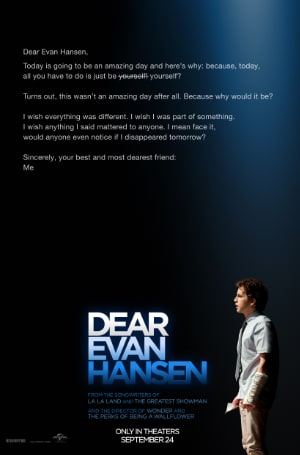I’ve never seen the stage play but the film adaptation of Dear Evan Hansen moved me deeply even when one of the characters unexpectedly burst into song. The music and lyrics by Benj Pasek and Justin Paul, who also created the music for the Broadway play, are subtle, calming, and yet passionately relatable. The underlying moral issue is that lying always comes into the light, but there is redemption for one who recognizes their mistake and tells the truth even when that means losing the friends he never really had. That’s what happens to Evan Hansen, reprised in the role by Tony award winner Ben Platt. This is a story for all those who have felt out-of-place in high school or who have never really fit in with particular social groups.
Evan is a high school senior who suffers from social anxiety disorder so has no friends. He sits alone at lunch, is picked on by the bullies, and is often home alone at night when his single-parent mother works late. Many films are surfacing that deal with mental illness in teens, and according to the director, Stephen Chbosky (Perks of Being a Wallflower, Wonder), that helps to “normalize it, by putting it on screen, so now it’s out in the world.” This topic cannot be emphasized enough considering that about one in five teenagers between the ages twelve and eighteen suffer from some form of mental illness or anxiety disorder. This issue is begging to come to the fore of our social conversation, and filmmakers like Chbosky are not afraid to do it.
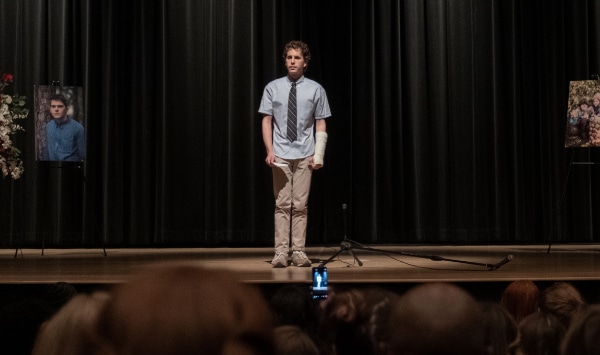
To cope, Evan’s therapist suggested that he write optimistic letters to himself. One of these letters is swooped up by the troubled Connor Murphy (Colton Ryan) after haphazardly signing Evan’s arm cast which he needed after falling out of a tree. Worried that his letter will show up on social media, Evan becomes frantic. The next day at school he is called into the school office with Connor’s mother Cynthia (Amy Adams) and stepfather. Assuming that he and Connor were friends, Cynthia tells Evan that Connor took his own life and they found Evan’s letter in Connor’s pocket. They wanted to hear everything from Evan as Connor’s friend about who he was and what he liked since Connor had distanced himself from his family. Evan tried to speak but because of his anxiety he could not get the words out that they really weren’t friends.
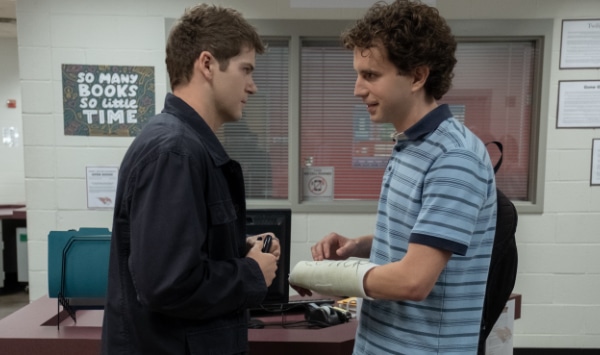
An unintended lie takes on a life of its own. When Cynthia invites Evan over for dinner, he makes up stories about he and Connor that they would go to the old apple orchard, a place the Murphy’s would go as a family when Connor and his sister Zoe (Kaitlyn Dever) were young. Evan admires Zoe despite her tough demeanor. When she hears of Evan’s relationship with Connor her attitude softens since she never had that type of interaction with Connor in their teen years. She connects with Evan in an emotional way that takes him off guard.
As the story spreads around the school, Evan receives sympathy and attention from the other students that he never experienced before. What started as a simple misunderstanding took on a life of its own and Evan began to enjoy the friendships and attention that came as a result. But the truth always comes to the light and Evan must face the fallout as a result.
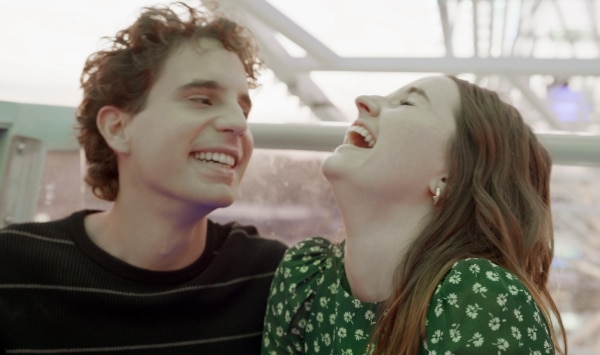
The music in the film speaks directly to our emotions. I confess that I cried whenever Evan sang “Waving through a Window” about being an outsider to the rest of the world. The loneliness and pain it expressed gave me great empathy for those who struggle to connect. In “If I could tell Her” Evan expresses his feelings to Zoe but pretending to be words from her brother Connor. It was a touching scene that made me rout for Evan even as his initial lie blossomed out of control. One of the most powerful musical pieces is sung by Julianne Moore as Evan’s mother Heidi Hansen. When he confesses to her about everything and how the Murphys welcomed him into their family where he felt he belonged for the first time in his life, Heidi communicates her unconditional love for him in the song “So Big/So Small.” Another tear-jerker moment. She alone loves him for who he is, how he is, no matter what he has done. At that moment, Evan discovers that he belongs. He matters.
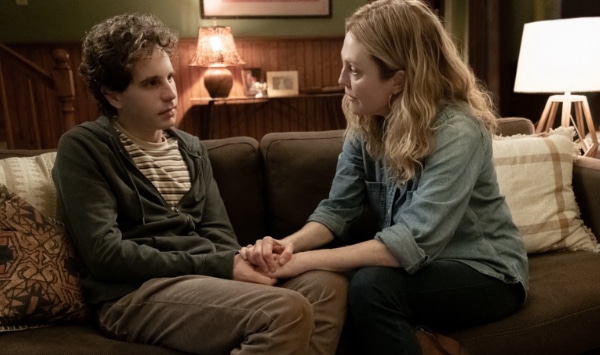
The movie, as well as the stage musical, is about being yourself and knowing you are never alone. This lesson is important, as Chbosky says, we cannot “talk about the dark without the light, depression without happiness” otherwise, we remain in the heaviness of pain. He continues, “We don’t help young people choose life without joy.” Hope alone gives people a reason to continue regardless of the pain, the loneliness, and the isolation. There is always more to life. Joy gives hope. Light gives happiness. And this film can be a wonderful catalyst for parents to speak to their teenagers about the hard issues that they face, offering moral lessons to inspire hope, courage, and uprightness. I just want to say, as the film does, “No one is ever alone!”

